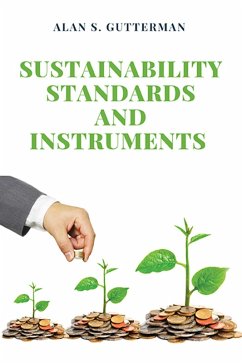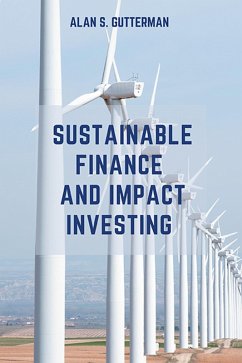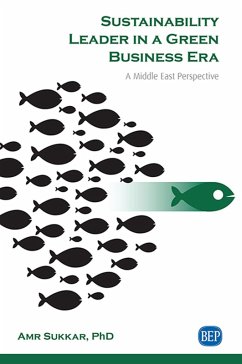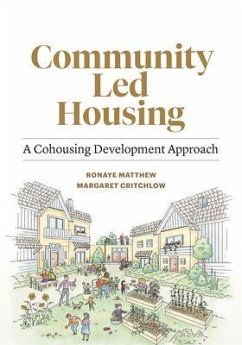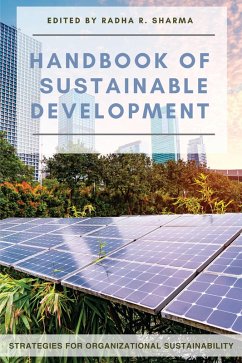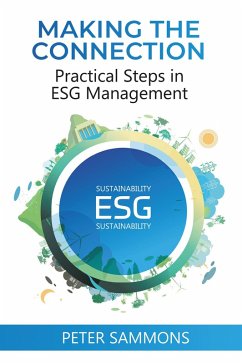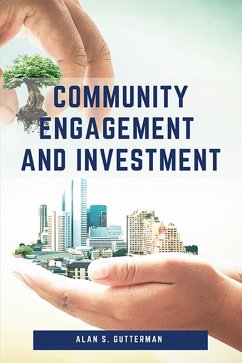
Community Engagement and Investment (eBook, ePUB)
Versandkostenfrei!
Sofort per Download lieferbar
9,95 €
inkl. MwSt.
Weitere Ausgaben:

PAYBACK Punkte
5 °P sammeln!
This book is a comprehensive guide to community engagement and investment, beginning with a survey of community-related voluntary standards and then turning to strategy and management, community engagement, community investment and reporting and communications on community-related activities.Sustainability is about the long-term wellbeing of society, an issue that encompasses a wide range of aspirational targets including ending poverty and hunger; ensuring healthy lives and promoting wellbeing for all; ensuring inclusive and equitable quality education and promoting lifelong learning opportun...
This book is a comprehensive guide to community engagement and investment, beginning with a survey of community-related voluntary standards and then turning to strategy and management, community engagement, community investment and reporting and communications on community-related activities.
Sustainability is about the long-term wellbeing of society, an issue that encompasses a wide range of aspirational targets including ending poverty and hunger; ensuring healthy lives and promoting wellbeing for all; ensuring inclusive and equitable quality education and promoting lifelong learning opportunities for all; and promoting sustained, inclusive and sustainable economic growth, full and productive employment and decent work for all.
Clearly the challenges associated with pursuing the goals are daunting and for most businesses it may be difficult for them to see how they can play a meaningful role in address them. While it is common for "society" to be identified as an organizational stakeholder, the reality is that one company cannot, acting on its own, achieve all the goals associated with societal wellbeing. However, every company, regardless of its size, can make a difference in some small, yet meaningful way, in the communities in which they operate, and more and more attention is being focused on the impact that companies have within their communities. Focusing on the community level allows an organization to set meaningful targets and implement programs that fit the scale of its operations and which can provide the most immediate value to the organization and its stakeholders. Societal wellbeing projects and initiatives must ensure that the organization does not compromise, and instead improves, the wellbeing of local communities through its value chain and in society-at-large.
This book is a comprehensive guide to community engagement and investment, beginning with a survey of community-related voluntary standards and then turning to strategy and management, community engagement, community investment and reporting and communications on community-related activities.
Sustainability is about the long-term wellbeing of society, an issue that encompasses a wide range of aspirational targets including ending poverty and hunger; ensuring healthy lives and promoting wellbeing for all; ensuring inclusive and equitable quality education and promoting lifelong learning opportunities for all; and promoting sustained, inclusive and sustainable economic growth, full and productive employment and decent work for all.
Clearly the challenges associated with pursuing the goals are daunting and for most businesses it may be difficult for them to see how they can play a meaningful role in address them. While it is common for "society" to be identified as an organizational stakeholder, the reality is that one company cannot, acting on its own, achieve all the goals associated with societal wellbeing. However, every company, regardless of its size, can make a difference in some small, yet meaningful way, in the communities in which they operate, and more and more attention is being focused on the impact that companies have within their communities. Focusing on the community level allows an organization to set meaningful targets and implement programs that fit the scale of its operations and which can provide the most immediate value to the organization and its stakeholders. Societal wellbeing projects and initiatives must ensure that the organization does not compromise, and instead improves, the wellbeing of local communities through its value chain and in society-at-large.
This book is a comprehensive guide to community engagement and investment, beginning with a survey of community-related voluntary standards and then turning to strategy and management, community engagement, community investment and reporting and communications on community-related activities.
Dieser Download kann aus rechtlichen Gründen nur mit Rechnungsadresse in A, D ausgeliefert werden.




